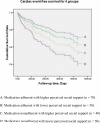Medication adherence, social support, and event-free survival in patients with heart failure
- PMID: 22746258
- PMCID: PMC4057061
- DOI: 10.1037/a0028527
Medication adherence, social support, and event-free survival in patients with heart failure
Abstract
Objectives: Medication adherence and perceived social support (PSS) are independent predictors of mortality in patients with heart failure (HF). However, the predictive power of the combination of medication adherence and PSS for hospitalization and death has not been investigated in patients with HF. The purpose of the study was to explore the combined influence of medication adherence and PSS for prediction of cardiac event-free survival in patients with HF.
Method: A total of 218 HF patients monitored medication adherence for 1-3 months and completed the Multidimensional Perceived Social Support Scale (MPSSS) at baseline. Medication adherence was measured using a valid and objective measure, the Medication Event Monitoring System (MEMS). Patients were followed for up to 3.5 years to collect data about cardiac event-free survival (i.e., cardiac emergency department visits, hospitalizations, and death). To test the association of the combination of medication adherence and PSS with outcomes, the interaction term of medication adherence and PSS was first entered in a Cox regression to predict outcomes. Second, patients were grouped using an evidence-based cutpoint of 88% for medication adherence from the MEMS data and a median score 71 of the MPSSS. Kaplan-Meier and Cox proportional hazards models were used to compare cardiac event-free survival among groups.
Result: Medication adherence and PSS were independent predictors of cardiac event-free survival (p = .006 and .021, respectively). Patients with medication nonadherence and lower PSS had a 3.5 times higher risk of cardiac events than those who were adherent and had higher PSS.
Conclusion: Medication adherence mediated the relationship between PSS and cardiac event-free survival in this sample. Moreover, medication adherence and social support independently, and in combination, predicted cardiac event-free survival in patients with HF. Interventions to improve clinical outcomes should address medication adherence and social support.
PsycINFO Database Record (c) 2013 APA, all rights reserved.
Figures
References
-
- Ackermann RT, Rosenman MB, Downs SM, Holmes AM, Katz BP, Li J, et al. Telephonic case-finding of major depression in a Medicaid chronic disease management program for diabetes and heart failure. Gen Hosp Psychiatry. 2005;27(5):338–343. - PubMed
-
- Ambardekar AV, Fonarow GC, Hernandez AF, Pan W, Yancy CW, Krantz MJ. Characteristics and in-hospital outcomes for nonadherent patients with heart failure: findings from Get With The Guidelines-Heart Failure (GWTG-HF). Am Heart J. 2009;158(4):644–652. - PubMed
-
- Annema C, Luttik ML, Jaarsma T. Reasons for readmission in heart failure: Perspectives of patients, caregivers, cardiologists, and heart failure nurses. Heart Lung. 2009;38(5):427–434. - PubMed
-
- Baron RM, Kenny DA. The moderator-mediator variable distinction in social psychological research: conceptual, strategic, and statistical considerations. J Pers Soc Psychol. 1986;51(6):1173–1182. - PubMed
-
- Bennett JA. Mediator and moderator variables in nursing research: Conceptual and statistical differences. Res Nurs Health. 2000;23(5):415–420. - PubMed
Publication types
MeSH terms
Grants and funding
LinkOut - more resources
Full Text Sources
Other Literature Sources
Medical
Research Materials
Miscellaneous



